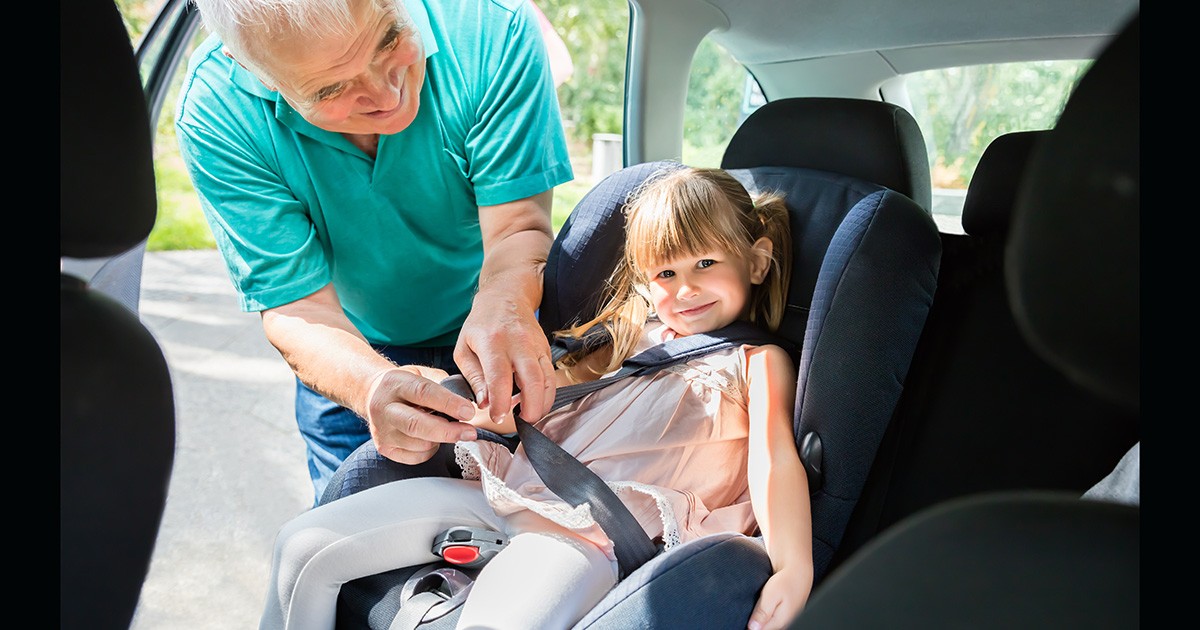Grandparents make key contributions to the lives of their grandchildren. Whether they are babysitting or providing full-time care, grandparents bring love, support and experience.
Like parents and other caregivers, grandparents play a crucial role in keeping children safe. Here are some important things for grandparents to know about caring for young children:
Infant Sleep Safety
In 2015, 142 infants died from sleep-related causes across Tennessee. Those causes include sudden infant death syndrome (SIDS), accidental suffocation and accidental strangulation. Remember that most sleep-related infant deaths can be prevented. Follow the ABCs of Safe Sleep:
“A” is for Alone: Always let babies sleep alone. Sleeping with another person, or with objects in the crib (such as blankets or stuffed toys), puts the infant at risk of being smothered. A baby who sleeps in a bed with someone else is nearly three times more likely to die than a baby who sleeps alone.
“B” is for Back: An infant should always be placed to sleep on their back, not on their side or stomach. Do this for every sleep.
“C” is for Crib: Always put infants to sleep in a crib or bassinet with only a firm mattress and tight-fitting mattress sheet. Babies should never sleep in an adult’s bed, on a couch or sofa, in a chair or on a soft surface.
Watch this safe sleep video [link to TDH video]
Car Seat Safety
Car crashes are the No. 1 killer of young children in the U.S. When you use the correct car seat or booster seat for a child, it can be a lifesaver.

Always use a rear-facing car seat for infants and toddlers and place them in the rear seat of the car. The American Academy of Pediatrics (AAP) recommends that infants and toddlers should sit in rear-facing car seats until age 2—or until they reach their maximum height and weight for their seat. A rear-facing car seat does a better job of supporting the head, neck and spine of infants and toddlers in case of a crash.
Children who have outgrown their rear-facing seat should use a forward-facing seat with a harness. A child should only be moved to a booster seat with a lap belt if they have outgrown their child car seat. Children should use a booster seat with a lap belt until they have reached the height of 4 feet, 9 inches. They should not ride in the front seat of the car until they are at least 13 years old.
Don’t be intimidated by a car seat once you take it out of the box. Click here for tips on how to install car seats.
Smoke-Free Lives
Tobacco smoke contains more than 7,000 chemicals, including toxic and cancer-causing agents. It’s important that children are protected from the dangers of secondhand and thirdhand smoke.
Secondhand smoke is smoke from burning tobacco products or smoke breathed out by a smoker. It can be especially harmful to children’s health because their lungs are still developing. Thirdhand smoke refers to the chemicals from cigarette smoke that cling to surfaces. They are the same chemicals found in tobacco smoke that can cause cancer.
Here are some guidelines to protect children:
- Encourage pregnant women in your life to be smoke free.
- Don’t allow anyone to smoke near children.
- Don’t smoke or allow others to smoke in your home or car.
- Don’t take your child to public places that allow smoking.
- Don’t use e-cigarettes or other electronic smoking devices around children.
The Tennessee Tobacco QuitLine is a toll-free telephone service (800-QUIT-NOW or 800-784-8669) that helps Tennesseans who want to quit smoking.
Poisoning Prevention
Poisoning is the second-leading cause of preventable child deaths in Tennessee. In 2012, more than half (54 percent) of poisonings in Tennessee involved children under age 5. Here are some guidelines to prevent poisoning:
Make sure all medicine and vitamins are stored out of reach and out of sight of children.
Place purses and bags in high locations, and avoid leaving medicine on a nightstand or dresser.
Close your medicine caps tightly after every use. Choose child-resistant caps for medicine bottles.
Be alert to visitors’ medicine. Offer to put their purses, bags and coats out of reach of children.
Drop off your unused or expired medications for proper disposal at drop boxes located in participating law enforcement offices or pharmacies.
If you have a poison emergency and need lifesaving treatment advice, call 911. If you are concerned about a possible poisoning, call the Poison Help hotline for advice at 800-222-1222.
Additional Resources
If you are a part-time caregiver or full-time guardian of your grandchild, the state of Tennessee and kidcentraltn.com offer many resources that will help you provide a safe and nurturing environment.
The Relative Caregiver Program (RCP) supports children who are being raised by grandparents, aunts, uncles and/or other extended family members.
Get some ideas for fun activities with children.
Check out the Tennessee GrandFacts state fact sheets for grandparents and other relatives raising children. The 11-page PDF includes helpful web links and phone numbers to agencies across the state.
Watch the 4E’s for Excellent Reading video for tips that will help build children’s love for reading: